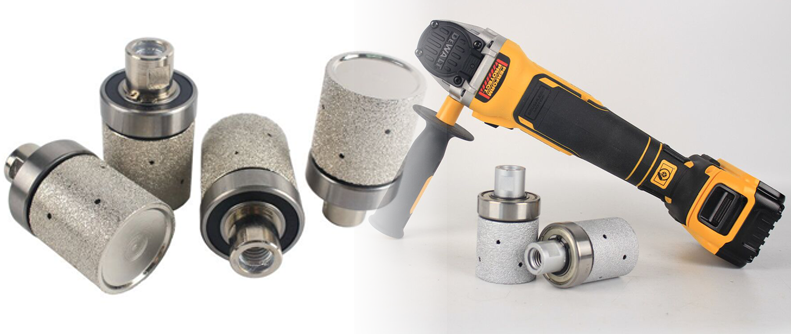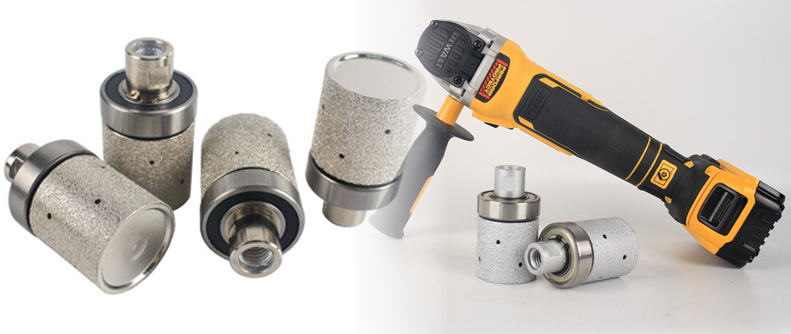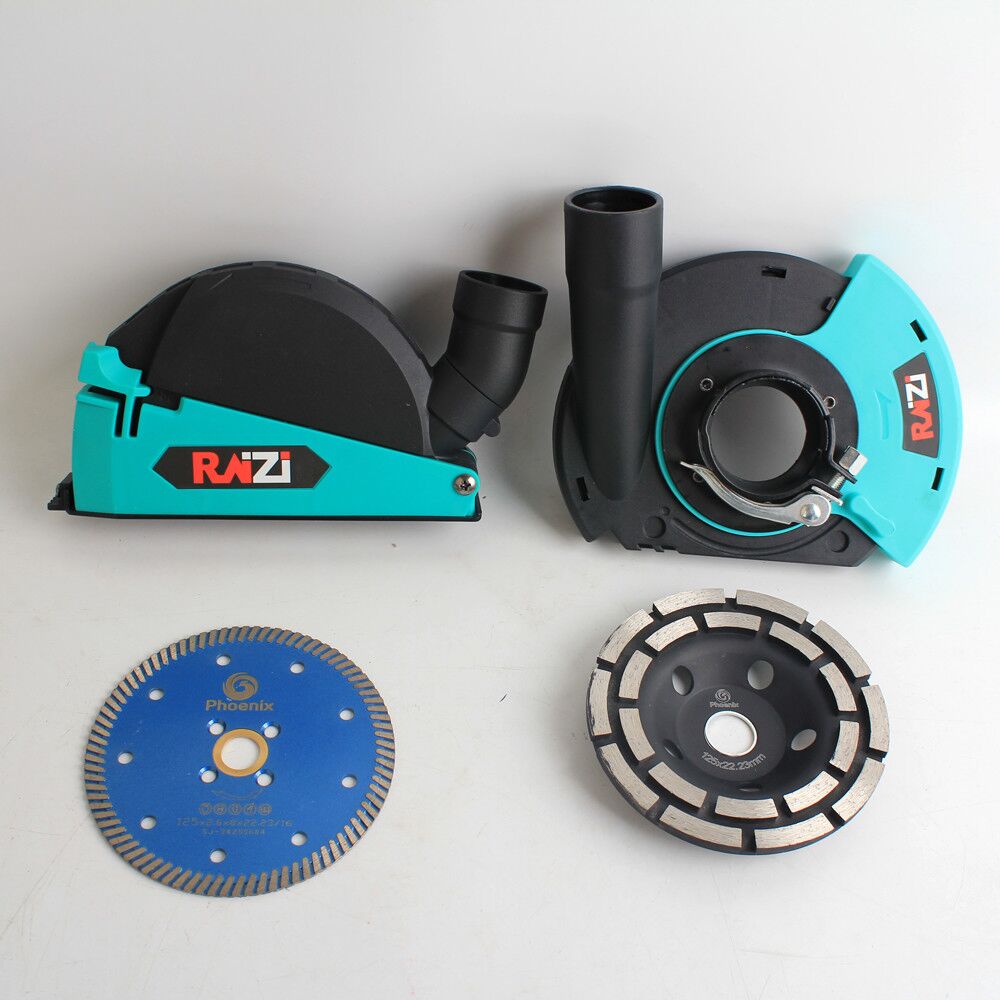A stone fabrication process includes several basic procedures such as cutting, grinding and polishing, through which a countertop with a satisfying gloss can be produced. And the whole thing is just the same when it comes to making holes, with the only difference lying in the tools involved.
Drilling, the first step of the process, requires a diamond core drill bit as the solution, and you can tap here to see our former blog about this tool for more information if you are interested. 链接The next step is grinding which aims to generate a consistent and smooth edge, which paves the way for the next polishing procedure for a beautiful gloss. This essay will focus mainly on the latter two steps and the tools involved: diamond drum wheels.
Just as I mentioned above, this kind of tool can be roughly divided into two categories according to its usage: zero tolerance diamond drum wheels for grinding, and polishing drum wheels for polishing, and each of them has several special designs as well as certain factors to notice, to which I will make a detailed explanation for you in the following part.
1. Zero tolerance diamond drum wheel
These wheels are used to clean up holes, making their edges smooth and consistent for the next step of polishing. On the market, there are plenty of them varying in material, design, size and grit number, and here I will make an explanation mainly focused on the former two factors.
A.Material
There are resin-filled wheels as well as regular no-resin wheels: the former favors in bounce reduction as well as well-balanced performance, while the latter boasts more aggressiveness.

Raizi resin-filled zero-tolerance diamond drum wheel is suitable for various stones like granite, marble, and engineered stone; with three degrees of grit number(coarse, medium and fine), it can also do some polishing jobs in addition to just grinding. And the resin bond filled within the wheel help a lot to reduce body vibration while it working.
And those without resin bonds, as we can imagine, are much more aggressive in performance. As the result, they are not recommended to polish things: their coarse( or small-numbered like #36 or #60) grit degrees are only allowed in the first two steps of the grinding procedure. However, they can give effect faster than resin-filled wheels in that field.
B. Rim design& manufacturing technique
Wheels with segmented rims can always five effect quicker than those with continuous rims, and are more efficient when tackling hard stones.

Raizi segmented zero tolerance drum wheels suit most for grinding granite and hare engineered stones; they can also be used for shaping and dressing up your stone in addition to just grinding sink hole edges. And with the most aggressiveness-adding design, they only have the coarse grit degree for stock removal and rough grinding.
In contrast with segmented wheels, continuous-rimmed wheels are less aggressive, and to guarantee their working efficiency, some advanced techniques are adopted in their manufacturing process. For example, we have Raizi vacuum-brazed diamond drum wheels which have extremely tough rims for improving working performance and reducing chippings. Their size varies from 25mm to 50mm and 75mm in diameter to meet our customers' demands.

And regular continuous-rimmed diamond drum wheels employed diamond particles embedded on the rim surface to lift up their aggressiveness, having two degrees of grit concentrations for dealing with finer grinding jobs than the segmented and vacuum-brazed ones.
 p.s. There is another type of vacuum-brazed diamond drum wheel that is equipped with a bearing on the top of its body, which adds more balance to it and makes it more suitable for use on radial arm machines.
p.s. There is another type of vacuum-brazed diamond drum wheel that is equipped with a bearing on the top of its body, which adds more balance to it and makes it more suitable for use on radial arm machines.

According to reports, grinding with zero tolerance diamond drum wheels is safer than doing the same works with other tools.
2. Diamond Polishing drum wheel
Raizi diamond polishing drum wheels are made of diamond particles and resin bonds, perfectly suitable for bringing gloss to hole edges on various stone materials like granite, marble, and engineered stones. The grit degree include #50,#100,#200,#400,#800,#1500 and #3000, same as a 7-step diamond polishing pad set.

In addition, these diamond drum wheels vary a lot in their size, from 25mm, 50mm, 75mm, to 100mm in diameter, with the height varying from 42mm to 50mm; they are also available for both thread types M14 and 5/8"-11", and can be used on either regular stone polishers, grinders or radial arm machines.
n short, here is our answer to the question “how to make a hole”: drilling with raizi core bit drills, grinding with raizi zero-tolerance diamond drum wheels, and polishing with raizi diamond polishing drum wheels.
OK, this is all content for today’s essay. I hope it can be helpful for you.
Raizi tool: good tools, easy work.





Leave a comment
This site is protected by hCaptcha and the hCaptcha Privacy Policy and Terms of Service apply.